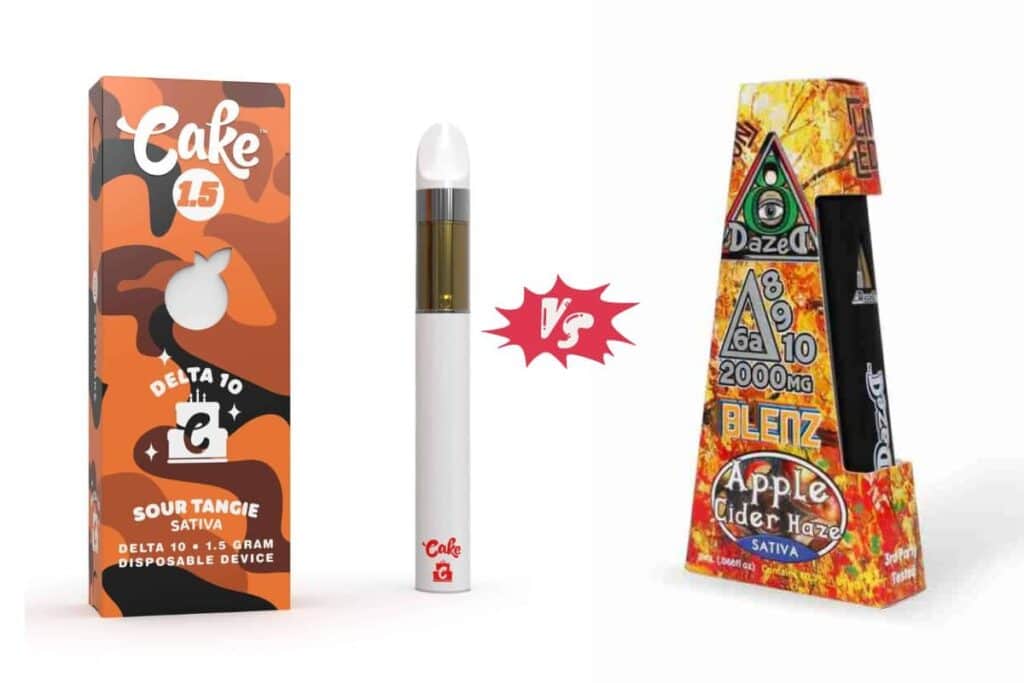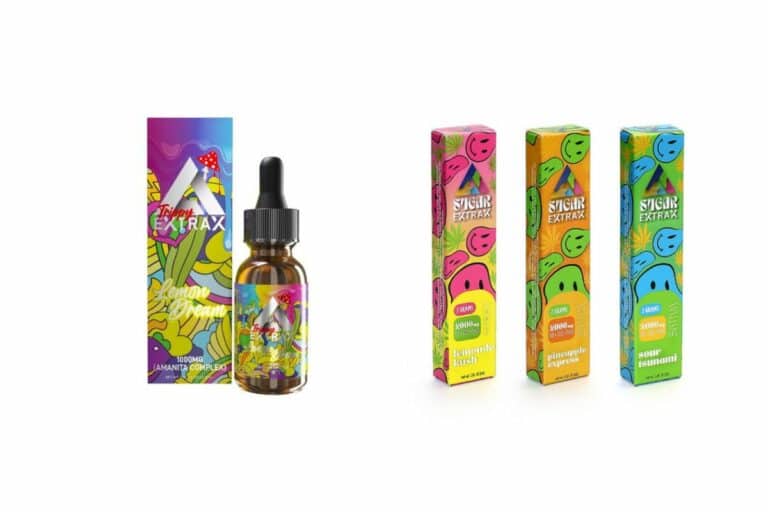Delta 10 vs Delta 8: Comparing Cannabinoid Effects and Benefits
The **cannabis and hemp** universe is always growing, loaded with new, **thrilling finds**. Lately, **Delta 8** and **Delta 10** THC have grabbed everyone’s attention because they’re pretty special. Think of them as cousins in the big cannabis family, similar but not quite the same. Their chemical makeup varies, so they give users different vibes. Keep reading to find out why you should give these two a try!
Delta 8 THC has gained popularity in recent years due to its milder effects compared to the well-known Delta 9 THC. It offers a more relaxed and functional high with less risk of anxiety and paranoia. On the other hand, Delta 10 is a relatively new cannabinoid, discovered only a few years ago.
This versatile compound has captured the attention of users and researchers alike, thanks to its unique properties that lie somewhere between Delta 8 and Delta 9 THC.
Key Takeaways
- Delta 8 and Delta 10 THC offer distinct experiences due to their unique molecular structures
- Delta 8 is known for a more relaxed high with less risk of anxiety and paranoia
- Delta 10, a newer cannabinoid, offers properties that lie between Delta 8 and Delta 9 THC
Delta 8 and Delta 10: An Overview
Delta 8 and Delta 10 are both cannabinoids found in the cannabis and hemp plants. As variations of tetrahydrocannabinol (THC), these compounds share similarities but also possess unique characteristics in terms of their molecular structure, effects on users, and legal status.
| Delta 8-THC is a less common cannabinoid compared to the more well-known Delta 9-THC, which is the primary psychoactive component in marijuana. Delta 8-THC has a slightly altered chemical structure, featuring a double bond on the 8th carbon chain instead of the 9th. This subtle shift results in a milder psychoactive effect and is believed to confer certain potential medical benefits such as anti-nausea and pain relief properties, as described in various studies. |
| Delta 10-THC, on the other hand, is a relatively recent discovery, and research on its properties and effects is still limited. Similar to Delta 8-THC, the double bond in Delta 10-THC is located on the 10th carbon chain. This distinction further alters its psychoactive effects, though the exact nature and intensity of these effects remain under investigation. As of now, anecdotal reports suggest that Delta 10-THC may produce a more clear-headed and stimulating experience compared to the sedative effects of Delta 8-THC. |
Both Delta 8 and Delta 10 are typically extracted from the hemp plant, as marijuana-derived products with a higher concentration of Delta 9-THC remain federally illegal in the United States.
However, the legal status of hemp-derived Delta 8-THC and Delta 10-THC products can be complicated due to varying state laws and ongoing debates over the interpretation of the 2018 Farm Bill.
In summary, Delta 8 and Delta 10 represent distinct forms of THC with unique molecular structures, which result in differing psychoactive effects and potential medical benefits. While research on these cannabinoids is still limited, they represent promising areas of study within the field of cannabis science.
The Key Differences
Delta 8 vs. Delta 10 Effects
Delta 8 THC and Delta 10 THC are two distinct cannabinoids found in cannabis plants. While both have psychoactive properties, they often produce different effects on users. Delta 8 is known for creating a calming and relaxing sensation, while Delta 10 tends to provide a more uplifting and energizing experience.
Potency Comparison
The potency of Delta 8 and Delta 10 THC varies, but both are generally considered less potent than Delta-9 THC, the primary psychoactive compound in marijuana. Despite the reduced potency, users may still experience psychoactive effects from both Delta 8 and Delta 10, albeit with differences in intensity and duration.
Side Effects and Safety
Common side effects associated with Delta 8 THC include dizziness, fatigue, and mild feelings of euphoria. Delta 10 users may experience similar side effects but are less likely to experience severe anxiety or paranoia. It is essential to use caution when consuming either cannabinoid and to start with low doses to minimize adverse side effects.

Medical Benefits and Uses
Delta 8 and Delta 10 both have potential medical benefits and uses, such as providing pain relief, reducing inflammation, and alleviating symptoms of depression or anxiety. Delta 8 has been noted for its ability to stimulate appetite and reduce nausea, making it a potential option for patients undergoing chemotherapy or managing chronic pain. Delta 10, though less studied, may offer similar benefits and could prove valuable for different medical conditions in the future.
Legal Aspects
The legality of Delta 8 and Delta 10 THC varies depending on location and regulations. In some jurisdictions, both cannabinoids are considered legal if derived from hemp, while others have stricter regulations surrounding their production and sale. It is essential to research your local laws and consult legal advice to ensure compliance.
Testing and Consumption
Reliable third-party testing and lab reports are crucial for ensuring the safety and quality of Delta 8 and Delta 10 products. Consumers should also be aware of various consumption methods, such as vaping, edibles, and tinctures, as different methods can produce unique experiences and effects.
The Endocannabinoid System
Both Delta 8 and Delta 10 interact with the body’s endocannabinoid system, primarily through CB1 receptors in the brain. These receptors are involved in various physiological processes, including pain, mood regulation, and appetite.
Extracting and Manufacturing
Delta 8 and Delta 10 can be extracted from cannabis or synthesized from other cannabinoids. The extraction methods used can influence the final product’s quality and potency, making it essential for manufacturers to follow industry best practices.
Further Research and Regulation
There is an ongoing need for more research and regulation of Delta 8 and Delta 10 THC to ensure their long-term safety and efficacy. As consumer interest in these cannabinoids grows, it is crucial for researchers to continue studying their effects, potential health benefits, and any possible risks.

Frequently Asked Questions
What are the main differences between Delta 10 and Delta 8?
Delta 10 and Delta 8 are both cannabinoids found in cannabis plants, but they have some key differences. Delta 8 is considered a less potent version of the well-known Delta 9-THC, while Delta 10 is a relatively new compound with limited research. Delta 8 is reported to have a milder, more relaxing effect, while Delta 10 has a reputation for providing an energetic and uplifting effect.
Which compound is more potent: Delta 8 or Delta 10?
Currently, Delta 8 is considered a more potent compound than Delta 10, mainly due to its higher affinity for the CB1 receptor in the body’s endocannabinoid system. However, more research is needed to fully understand the potency and effects of Delta 10, as it is a relatively new compound and scientific studies are limited.
Are there any safety concerns regarding Delta 10 consumption?
As Delta 10 is a relatively new compound, there is limited research on its safety profile. It is important to consult with a healthcare professional before using any cannabinoid, especially if you have any pre-existing health conditions or are taking medications. It is also advised to use Delta 10 products from reputable manufacturers to ensure quality and safety.
What benefits can one expect from Delta 10 compared to Delta 8?
While both Delta 8 and Delta 10 have potential therapeutic benefits, they may offer different experiences. Delta 8 has been reported to provide a calming and relaxing effect, which may be beneficial for managing stress, anxiety, or sleep disorders. On the other hand, Delta 10 is said to produce an energetic and uplifting effect, which may be more suitable for daytime use, enhancing focus and creativity.
Can Delta 8 and Delta 10 be legally mixed?
The legal status of Delta 8 and Delta 10 varies depending on the country and region. In some areas, Delta 8 is legally available, while in others it may still be classified as a controlled substance. Similar legal restrictions may apply to Delta 10. It is always recommended to check the laws and regulations in your area regarding the use and mixing of cannabinoids before attempting to combine them.
Do Delta 8 and Delta 10 show up differently on drug tests?
Both Delta 8 and Delta 10 are chemically similar to Delta 9-THC, the primary psychoactive component in cannabis. As a result, they could potentially show up as positive for THC on a drug test. However, specific drug tests may vary in their sensitivity and accuracy, and it is uncertain whether they can accurately differentiate between Delta 8, Delta 10, and Delta 9-THC.
Resources:







